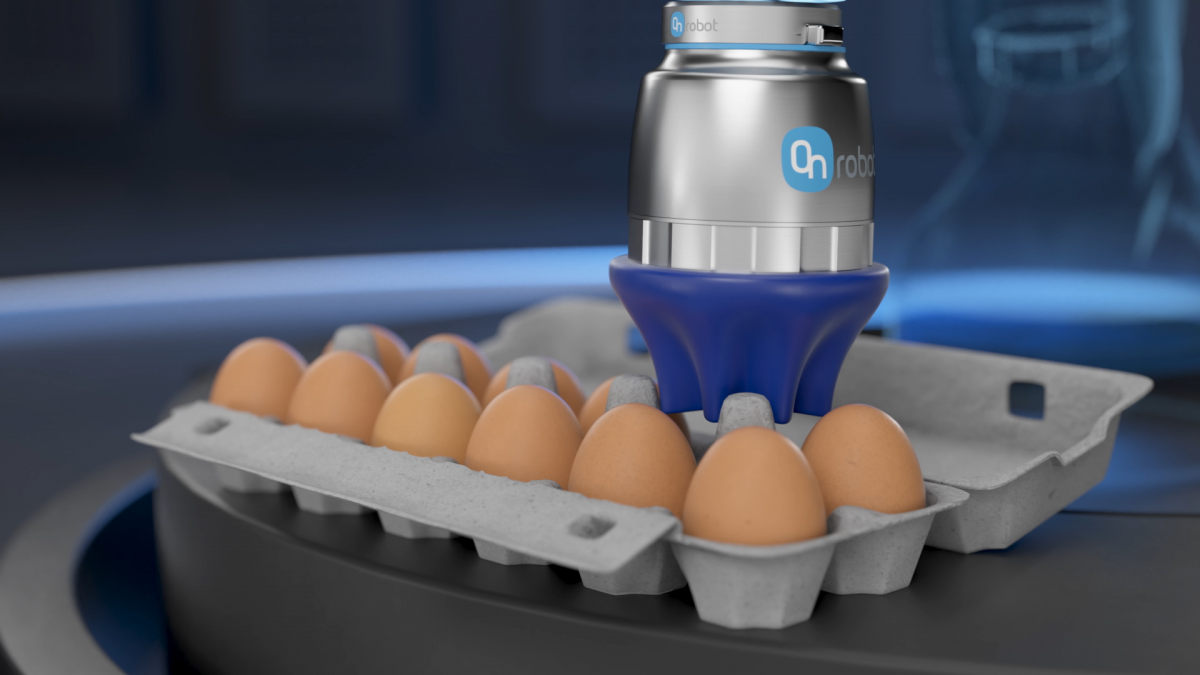The OnRobot food-grade Soft Gripper is able to pick a wide array of irregular shapes and delicate items in food and beverage, cosmetics and pharmaceuticals production, as well as manufacturing or packaging.
The flexible OnRobot Soft Gripper uses three interchangeable silicon-molded cups in star and four-finger configurations to pick up almost any small object under 2.2kg with a delicate, precise touch. The electric Soft Gripper is food-grade certified (complies with FDA 21 CFR for non-fatty items and EC 1935/2004) and unlike traditional vacuum grippers, it requires no external air supply, so it can reduce both cost and complexity.
“Our new Soft Gripper is challenging existing solutions for picking hard-to-grasp, delicate and odd-sized items,” says CEO of OnRobot, Enrico Krog Iversen. “Unlike proprietary solutions, the Soft Gripper offers seamless integration with most collaborative robots and light industrial robots through our One System Solution.”
OnRobot’s award-winning One System Solution is a platform that provides a unified mechanical and electrical interface between leading robot arms and any OnRobot end-of-arm tooling (EoAT). The One System Solution has been newly expanded to include integration with robots from ABB Robotics and Hanwha Precision Machinery. Now, users of those robots can take advantage of the unified mechanical and electrical interface of any OnRobot product, for easier integration and faster ROI.
While the Soft Gripper is ideal for food and beverage applications, it also provides flexible, delicate gripping for manufacturing and packaging.

Soft Gripper features:
- Up to 2.2kg payload based on shape, softness and friction of items to be handled
- Grip dimensions ranging from 10mm-118mm depending on cup used
- FDA certification
- Flexible, interchangeable silicon cups
- Ideal handling for delicate objects and irregular shapes
- No need for supplied air
- Fast, flexible deployment with seamless integration on all major robot brands
Increasing demand in Asia
There is a growing demand for Industry 4.0 technologies in Southeast Asia such as robotics and automation, as the region journeys towards becoming the next “factory of the world”. These disruptive technologies could potentially create $25 billion to $45 billion of annual economic impact in the region by 2030, according to McKinsey Global Institute’s research.[1]
According to the IDC Worldwide Semi-annual Robotics and Drones Spending Guide, spending on robotics and associated services will reach $129.4 billion by 2022, three times the spending in 2018, with a five-year CAGR of 25.2% during 2017-2022 in Asia Pacific excluding Japan (APEJ).[2]
The collaborative robots market in Asia Pacific will grow at a 2020-2026 CAGR of 45.46% with an addressable cumulative market value of $13.17 billion over the next seven years in terms of cobot hardware.[3] The Asia Pacific pharmaceutical & cosmetics industrial robot market is expected to grow by 13.3% annually and reach $544.67 million by 2025[4], while the food robotics market will reach $1,162.3 million by 2026, grow at a 14.6% CAGR over 2019-2026.[5]
[1] https://www.iaasiaonline.com/robotics-integration-to-transform-southeast-asia-into-worlds-factory-2/ [2] https://www.idc.com/getdoc.jsp?containerId=prAP44789019 [3] https://www.analyticsinsight.net/collaborative-robots-advance-work-around-obstacles/ [4] https://www.marketwatch.com/press-release/asia-pacific-pharmaceutical-cosmetics-industrial-robots-market-market-analysis-by-industry-sizedevelopment-and-demand-forecast-to-2025-2019-10-01 [5] https://www.marketwatch.com/press-release/asia-pacific-food-robotics-market-analysis-by-size-share-growth-trends-and-forecast-to-2026-2020-01-06
Womens Nike Cortez














